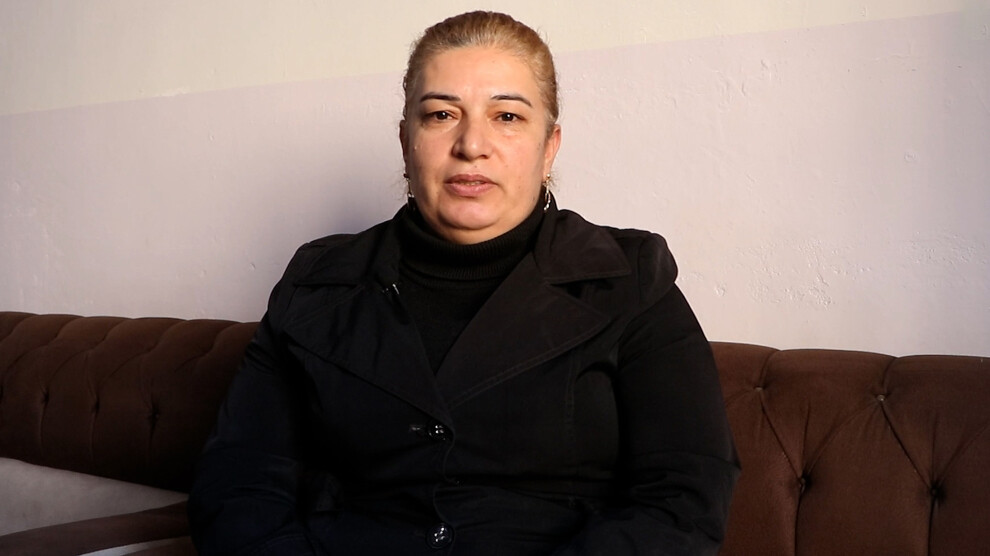Nêrgiz Bekir of Kongra Star: New construction of Syria is possible by embracing the revolution in Rojava
Nêrgiz Bekir, coordinating member of Kongra Star in Aleppo, says the construction of a free Syria is possible by embracing the revolution in Rojava. “Women’s struggle for freedom cannot be stopped.”

DILPAK DAĞ
Aleppo-Sheikh Maqsoud, located on Mount Seydê, is one of the largest neighborhoods of Aleppo. Being a Kurdish-majority neighborhood, it is also home to people of different nationalities and religions. Despite the crisis that broke out in Syria in 2011 and ongoing attacks, people live together in the neighborhood.
Arabs, Kurds, Yazidis, Christians and Alevis live together
At the foothills of Mount Seydê, there is a Christian cemetery next to a mosque and a historical Jewish cemetery, also a cemetery of German soldiers who lost their lives during World War II. Mineral agricultural soils in the neighborhood have almost disappeared because the neighborhood has many displaced people and makeshift houses have been built on agricultural land areas.
Arabs, Kurds, Yazidis, Christians and Alevis live together in the neighborhood despite the attacks on the neighborhood.
Nêrgiz Bekir: Aleppo is the heart of Syria
“Aleppo is the heart of Syria,” said Nêrgiz Bekir, coordinating member of Kongra Star in Aleppo, commenting on the ongoing Syrian crisis. “Because people of different nationalities, religions and minorities live in Aleppo.”
Nêrgiz Bekir pointed to the women’s struggle and resistance in the neighborhood. “Kurdish women lead the women’s struggle for freedom in the neighborhood. Kurdish, Arab, Armenian, Syriac, Yazidi and Alevi women also take their place in this struggle. Since the beginning of the revolution (in Rojava), the neighborhood has had a model of living based on equality.”
Nêrgiz Bekir also talked about the attacks of the Baathist regime and armed groups on the unity of people in the neighborhood. “There were, of course, attempts to create trouble and spread gossip and rumors among people of different nationalities and religions, aiming at destroying their unity. Despite all the attempts and attacks, women always stand strong, defending their neighborhood.”
‘We have made great efforts to embrace all women in Aleppo’
Nêrgiz Bekir also mentioned the effects of the chaotic process in Syria. “This chaotic process now affects people across Syria. Women are most affected by the ongoing war in Syria; they have faced displacement, massacres, rights violations and violence. As women, we have made great efforts to embrace all women in Aleppo and its neighborhoods.”
‘Our resistance continues’
“Today, women and children are killed in Syria. Strengthening the resistance against the recent attacks is our duty,” Nêrgiz Bekir said, stressing that they would never allow their gains to be destroyed. “We have gains and rights that we have achieved by resisting. Our resistance continues. We follow in the footsteps of our martyrs, who made the supreme sacrifice for the revolution. As the people of Aleppo and its Sheikh Maqsoud and Ashrafieh neighborhoods, we will liberate our homeland again.”
‘We reject the mindset that imposes slavery’
We also aim to disrupt the status quo of gender roles, said Nêrgiz Bekir, recalling that the revolution in Rojava led by Kurdish women has been going on for over 10 years. “Despite the great resistance, we must eliminate the mindset in Syria saying ‘women should stay at home, they should cover their heads, they should have children, and they should serve men and children’. We reject the mindset that imposes slavery on women.”
Embracing the revolution in Rojava
The construction of a free Syria is possible by embracing the revolution in Rojava, Nêrgiz Bekir emphasized. “Thousands of women lost their lives while fighting for the revolution. Women’s struggle for freedom cannot be stopped. As women, we will fight for our freedoms and rights.”
